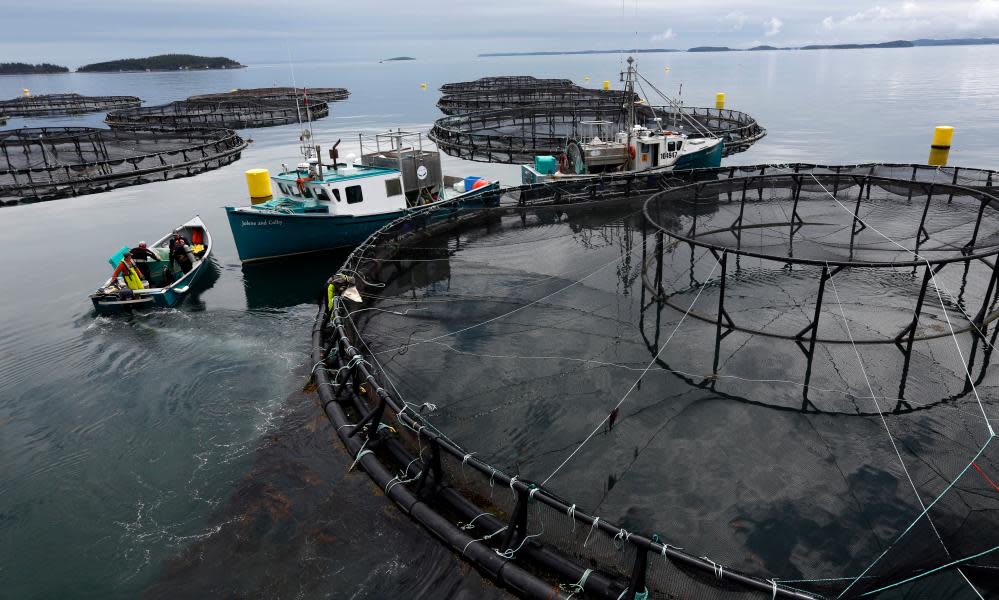Canada’s attempt to phase out open-pen salmon farms faces setback

Canada’s effort to phase out open-pen salmon farms has hit a roadblock after a federal judge said farmers had been blindsided by a government order to shut down.
Federal court judge Elizabeth Heneghan ruled earlier this month that former fisheries minister Bernadette Jordan had failed to grant farm operators the right to procedural fairness when she announced plans to phase out the farms, and criticized the minister’s lack of clarity surrounding the controversial decision that companies said would cost them millions in losses.
In December 2020, Jordan announced that 19 salmon farms in the Discovery Islands, a region off the coast of British Columbia, would be shut down by 2022. She also said that no transfer of fish between hatcheries and the open-pen farms would be allowed during the 18-month phase-out period.
In response to the order, salmon farmers have started shutting down their operations in the Discovery Islands – but have also fought the orders in court.
In ordering the closure of the farms, Justin Trudeau’s Liberal party was acting on the advice of a government commission into the decline of wild sockeye salmon. The Cohen commission found in 2012 that the Discovery Islands functioned as a bottleneck along salmon migration routes – and that closing the farms would reduce risk to wild salmon. Nine government reports, however, found the farms posed minimal risk to the wild salmon.
“[Farmers] submit that they were not given notice of the scope of the decision nor notice that transfer licences would be banned,” Heneghan wrote in her decision, calling the minister’s response to concerns “inadequate”.
The judge said that for a decision that would cost the companies millions in losses, the fisheries minister owed the companies a through explanation for her decision. “A news release does not provide reasons. A news release is a means for a person … to express a viewpoint of opinion. The consequences of the decision in this case are significant and the minister owed a duty to provide reasons.”
Fish farming has become a flashpoint between environmental activists, First Nations leaders and farmers, but the recent ruling is a blow to Trudeau’s pledge to phase out the industry in the region by 2025.
In March, the First Nations Wild Salmon Alliance urged the government to continue working to close the farms, blaming “fragmented management decisions at both the federal and provincial levels” for the “precarious extinction-level state of wild salmon”.
Last month, the premier of British Columbia warned the prime minister that closures without a clear transition plan would “undermine the economies of dozens of communities” in the region.
Related: Canada ignored warnings of virus infecting farmed and wild salmon
In closing the farms, Canada would have been one of the first countries in the world to force a shift from open-pen farming to closed water systems. In the United States, both Alaska and Washington state have looked to reign in fish farms amid growing concerns that the farmed salmon could pose a risk to ailing wild salmon stock.
Last month, a newly released Canadian government report showed that for nearly a decade, its own scientists were concerned that farmed Atlantic salmon were a vector for spreading the highly contagious Piscine orthoreovirus.
Heneghan’s ruling also enforces a previous injunction which permits fish farms to restock salmon until the farms close.
The BC Salmon Farmers association said it was “encouraged” by the court decision.
A spokesperson for fisheries minister Joyce Murray said she is aware of the court’s ruling and will be making a decision on next steps soon.
“[Minister Murray] remains committed to transitioning away from open-net pen salmon farming in coastal British Columbia waters,” said press secretary Claire Teichman.

 Yahoo News
Yahoo News 
